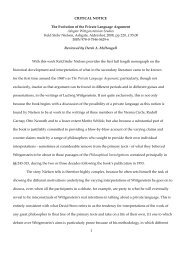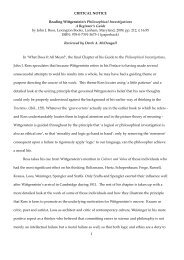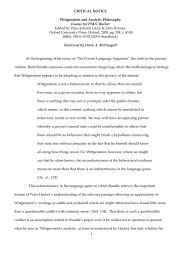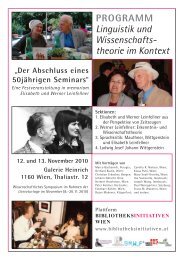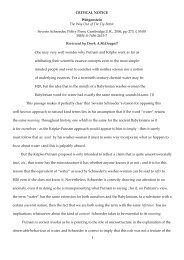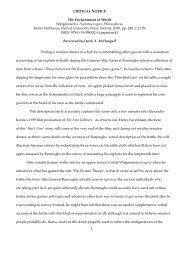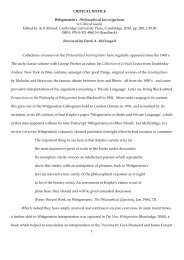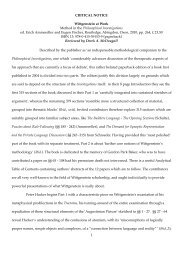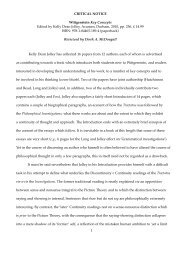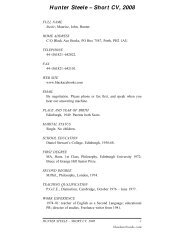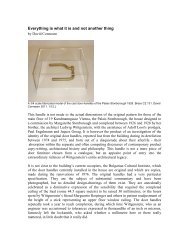Wittgenstein and Cambridge Family Resemblances
Wittgenstein and Cambridge Family Resemblances
Wittgenstein and Cambridge Family Resemblances
You also want an ePaper? Increase the reach of your titles
YUMPU automatically turns print PDFs into web optimized ePapers that Google loves.
of a piece as an infinite longitudinal strip, but possible if a cross-section is seen as<br />
a piece/a complete, definitive piece. — But then we never come to an end with<br />
our task. Quite so, since there is no end to it.<br />
Der Philosoph ist nicht Bürger einer Denkgemeinde. Das ist, was ihn zum<br />
Philosophen macht.<br />
The philosopher is not a citizen of any community of ideas. That is what makes<br />
him a philosopher.<br />
In that same year, in a draft for a lecture, he explains to his students the significance of<br />
his philosophy for science: how to ask the right questions, that is the right way to look<br />
at philosophical problems, <strong>and</strong> how to dissolve the knots in our language <strong>and</strong> in our<br />
thinking:<br />
What I should like to get you to do is not to agree with me in particular opinions<br />
but to investigate the matter in the right way. To notice the interesting kind of<br />
things (i.e. the things which will serve as keys if you use them properly).<br />
What different people expect to get from religion is what they expect to<br />
get from philosophy.<br />
I don’t want to give you a Definition of Philosophy but I should like you<br />
to have a very lively idea as to the characters of philosophical problems. If you<br />
had, by the way, I could stop/start/ lecturing at once.<br />
To tackle the philosophical problem is difficult as we are caught in the<br />
meshes of language. „Has the universe an end/beginning/ in Time“ (Einstein)<br />
You would perhaps give up Philosophy if you knew what it is. You want<br />
explanations instead of wanting descriptions. And you are therefore looking for<br />
the wrong kind of thing. Philosophical questions, as soon as you boil them down<br />
to . . . . change their aspect entirely. What evaporates is what the intellect cannot<br />
tackle.<br />
<strong>Wittgenstein</strong> <strong>and</strong> science<br />
<strong>Wittgenstein</strong>’s critique of modern science becomes particularly clear after the dropping<br />
of the atom bombs on Hiroshima <strong>and</strong> Nagasaki on the 6 th <strong>and</strong> on the 9 th of August<br />
1945. In fact, it is quite similar to that of Bertolt Brecht.<br />
On the occasion of the second performance of his historical drama “The Life of<br />
Galileo“, on the 30 th of July 1947 in Beverly Hills, Brecht extends the moral argument of<br />
his didactic play by accusing Galileo of the betrayal of science: „G gab den eigentlichen<br />
Fortschritt preis, als er widerrief, er ließ das Volk im Stich, die Astronomie wurde<br />
wieder ein Fach, Domäne der Gelehrten, unpolitisch, isoliert.“ “G ab<strong>and</strong>oned real<br />
progress when he retracted, he ab<strong>and</strong>oned the people, astronomy became a discipline<br />
again, a domain of the academics – apolitical, isolated.“ That is, Galilei relegated science<br />
from a means for everyone to underst<strong>and</strong> the world better <strong>and</strong> – with it – themselves,<br />
back into a domain for specialists. And it is only in the context of specialization that a<br />
development such as that of the atom bomb was possible; the world <strong>and</strong> everything<br />
that exists on it does not need it. When Albert Einstein, whom Brecht deeply<br />
13<br />
14<br />
15



